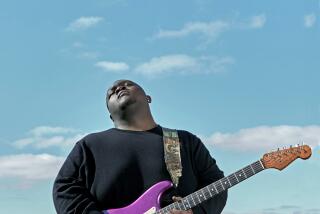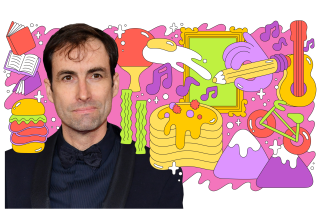Getting Out From Under Bird’s Wings
- Share via
Like many of his fellow alto saxophone players, Charles McPherson has long lived in the shadow of bebop giant Charlie “Bird” Parker, something he feels isn’t such a bad thing.
But it’s a mistake to categorize McPherson exclusively as a Parker clone, as do some jazz guides on the market. Recent albums for the New York-based Arabesque label, in which he employs such post-bop-and-beyond musicians as pianist Mulgrew Miller, drummers Victor Lewis and Lewis Nash and trumpeter Tom Harrell, reveal a fully realized saxophonist who has absorbed the lessons of Bird and has gone on to develop his own, highly personalized sound.
“Alto players often get saddled with that [Charlie Parker] thing because they play the same instrument,” McPherson said from his home in La Jolla.
“It’s because the comparison is so easily made. Anybody playing music since 1940 owes a debt to Charlie Parker. If a bell would ring every time somebody plays one of Bird’s lines, whether they’re playing tenor or trumpet or piano or anything, that bell would be all you’d hear. His input into the music was so encompassing that nobody escaped.”
McPherson, 57, who leads a quartet at Steamers in Fullerton on Saturday, came out of Detroit and gigs with pianist Barry Harris and trumpeter Lonnie Hillyer to become one of the contenders for Parker’s crown after Parker’s death in 1955. Beginning in 1960, McPherson spent more than 12 years as a member of the Charles Mingus Jazz Workshop, and he often led his own bands in conjunction with Harris and Hillyer during this period. His style, he says, was in constant development.
“Bebop was just a jumping off point. I also gained a lot of experience working with Mingus. Though Parker is my most obvious influence, I’ve also listened to a lot of classical music, lots of Duke Ellington and others, and I’ve not been totally unaware of what was going on in popular music all these years. I’m like a branch, connected to the bebop tree but still doing something that’s different.”
McPherson credits his longtime friend Harris (someone also frequently saddled with the bebopper designation) as an influence who emphasized the “intellectual side of the music.”
“He taught me theory, showed me how to look at certain elements of harmony, and he stressed being melodically consistent, how to connect phrases one to another in musical sentences.”
From Mingus, he explains, he learned the serious side of composition and how to instill music with power.
“I was so much younger when I joined the [Mingus] band that we had a kind of father-son relationship. I was nervous when I first joined because of his [feisty] reputation and because the music was tricky. I was greatly in awe of him. But I relaxed as the years went by, and he really influenced my writing.”
Examples of all these influences will surface in McPherson’s next recording, a sax-and-strings date that Arabesque will record in April.
“It’s a thematic album, lots of romantic music with the strings. I’ll probably have one song dedicated to Parker and will do some of the tunes that Parker did on his recordings with strings.”
But there will be plenty of tunes that have nothing to do with Parker, he said, and those that do will have more ambitious arrangements.
“Most of the arrangements they had for Bird’s string albums were pretty mundane and bland. We’ll be making them more novel, with modern, more inventive harmonies [written by arranger Mike Mossman], more interesting [accompaniment] all around, not just something soft for the saxophone to play over.”
Between now and the time the album is recorded, McPherson will maintain his usual busy pace, with a tour of England and the Netherlands scheduled next month. McPherson makes infrequent trips to New York, last appearing there in October at the Carnegie Hall tribute to Clint Eastwood, “Eastwood: After Hours.” McPherson serenaded the actor with a hot version of the bebop anthem “Cherokee.”
When he plays Steamers with pianist John Opferkuch, bassist Jeff Littleton and drummer Donald Dean, McPherson will give a nod to bebop but will also show other sides of his play that have developed since the late ‘50s.
“I always touch on the blues, every evening when I play,” he said. “Even though a lot of bebop numbers are written on blues changes, they are sometimes played without a feeling for the blues. But I consider myself somebody that has that feeling.”
* The Charles McPherson Quartet performs Saturday at Steamers Cafe, 138 W. Commonwealth Ave., Fullerton. 8:30 p.m. No cover, two-drink minimum. (714) 871-8800.
More to Read
The biggest entertainment stories
Get our big stories about Hollywood, film, television, music, arts, culture and more right in your inbox as soon as they publish.
You may occasionally receive promotional content from the Los Angeles Times.










